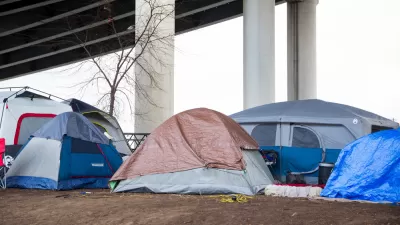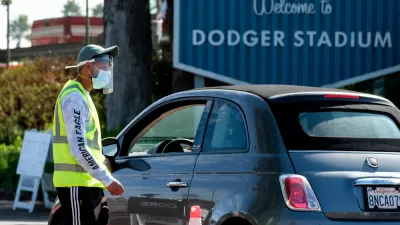San Francisco and the Bay Area, known for their exorbitant housing prices and not unrelated, strong NIMBY attitudes, could be softening their opposition toward increasing density in their neighborhoods.
A poll by the Bay Area Council reveals that over half of respondents, all Bay Area residents, are so concerned about the high cost of living that they are willing to accept increased density in their neighborhoods, particularly if new housing is affordable.
"Housing woes in the Bay Area have become so severe that two out of three residents now believe it's tougher to find a place to live, and at least half are ready to embrace higher-density housing in their neighborhoods to help tackle the problem, a poll released (June 25) shows," writes George Avalos for the San Jose Mercury News.
Higher-density housing development was supported by 56 percent of Santa Clara County residents, 55 percent of Alameda County residents and 53 percent of San Francisco residents, according to the poll.
What's more, 76 percent of residents want policy makers and developers to direct their efforts toward the creation of certain types of housing. Specifically, respondents want the focus on housing for low- and middle-income people
"Water isn't the only thing that is in short supply in the Bay Area," said Jim Wunderman, president of the Bay Area Council. "Our region is growing, our economy is humming, but the housing shortage could be our Achilles heel."
Hat tip to Gladwyn D'Souza.
FULL STORY: Bay Area housing crisis may cause NIMBY attitudes to wane

Maui's Vacation Rental Debate Turns Ugly
Verbal attacks, misinformation campaigns and fistfights plague a high-stakes debate to convert thousands of vacation rentals into long-term housing.

Planetizen Federal Action Tracker
A weekly monitor of how Trump’s orders and actions are impacting planners and planning in America.

In Urban Planning, AI Prompting Could be the New Design Thinking
Creativity has long been key to great urban design. What if we see AI as our new creative partner?

Opinion: LOS has ‘No Redeeming Quality’
The commonly used Level of Service metric that grades intersections based on traffic speed rather than safety is a key contributor to dangerous roadways.

San Francisco Mayor Backtracks on Homelessness Goal
Mayor Dan Lurie ran on a promise to build 1,500 additional shelter beds in the city, complete with supportive services. Now, his office says they are “shifting strategy” to focus on prevention and mental health treatment.

How Trump's HUD Budget Proposal Would Harm Homelessness Response
Experts say the change to the HUD budget would make it more difficult to identify people who are homeless and connect them with services, and to prevent homelessness.
Urban Design for Planners 1: Software Tools
This six-course series explores essential urban design concepts using open source software and equips planners with the tools they need to participate fully in the urban design process.
Planning for Universal Design
Learn the tools for implementing Universal Design in planning regulations.
Gallatin County Department of Planning & Community Development
Heyer Gruel & Associates PA
JM Goldson LLC
Mpact (founded as Rail~Volution)
City of Camden Redevelopment Agency
City of Astoria
Jefferson Parish Government
Camden Redevelopment Agency
City of Claremont





























